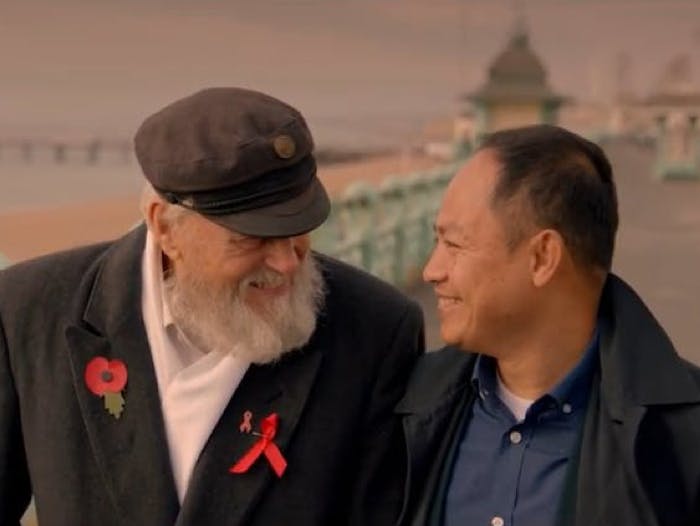UNMET NEEDS OF ELDERLY PEOPLE LIVING WITH HIV AND MEN WHO HAVE SEX WITH WOMEN
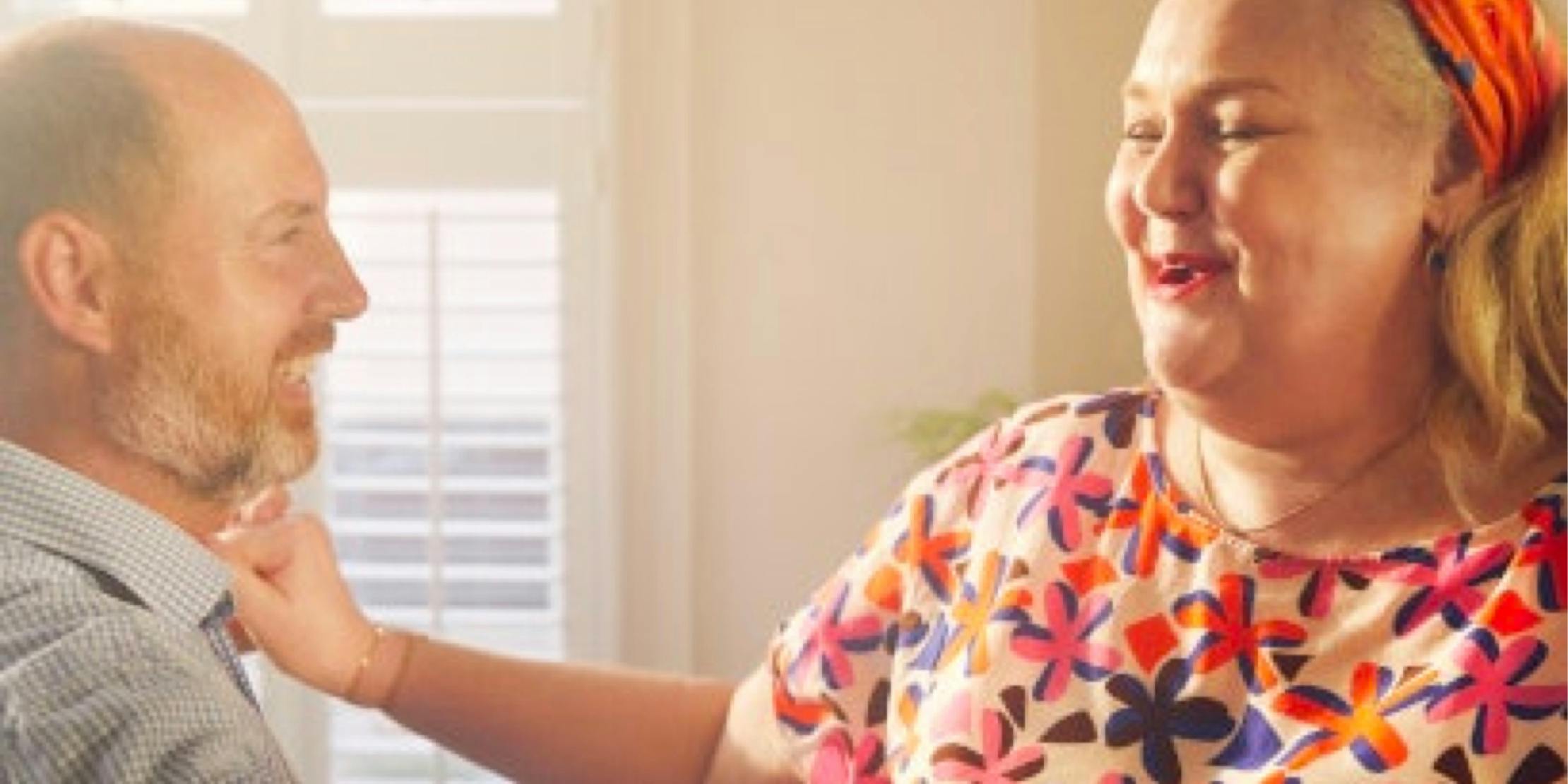
As many people living with HIV (PLHIV) can look forward to near normal life expectancies thanks to advances in antiretroviral therapy (ART),1 tailored support across age groups, gender and sexual orientation can have wide-reaching benefits beyond viral suppression.
Positive Perspectives data shared at the HIV Glasgow 2020 congress revealed new insights into the association between healthcare provider communication, treatment challenges and self-care amongst people living with HIV in Europe. Global results also identified greater challenges for older people who have been newly diagnosed with HIV and for men having sex with women.
Findings from people living with HIV in Europe underscore benefits of healthcare provider engagement
Data from Positive Perspectives showed greater reported engagement with healthcare providers was associated with greater reported self-empowerment, treatment satisfaction, and self-rated health amongst people living with HIV.2
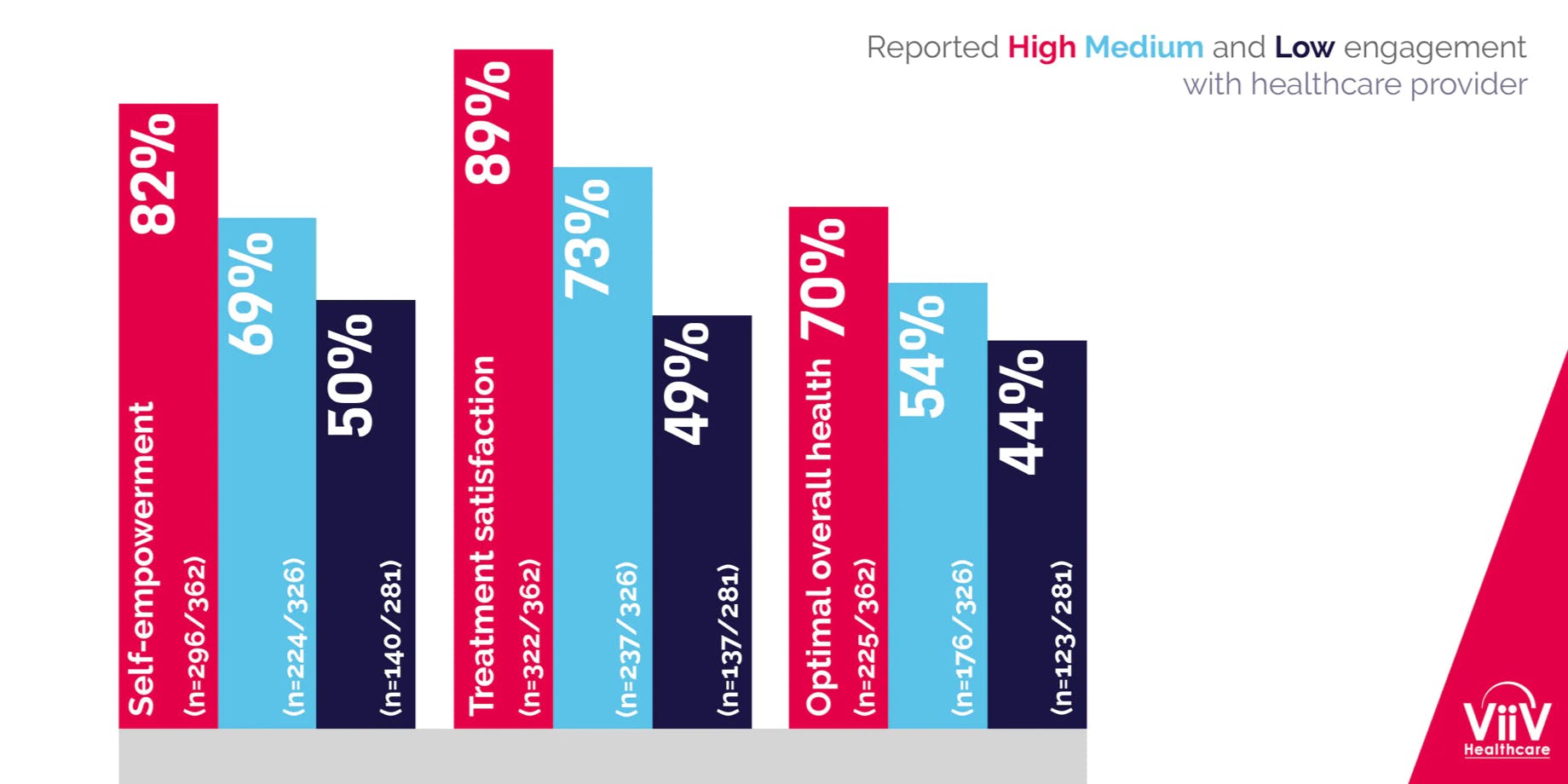
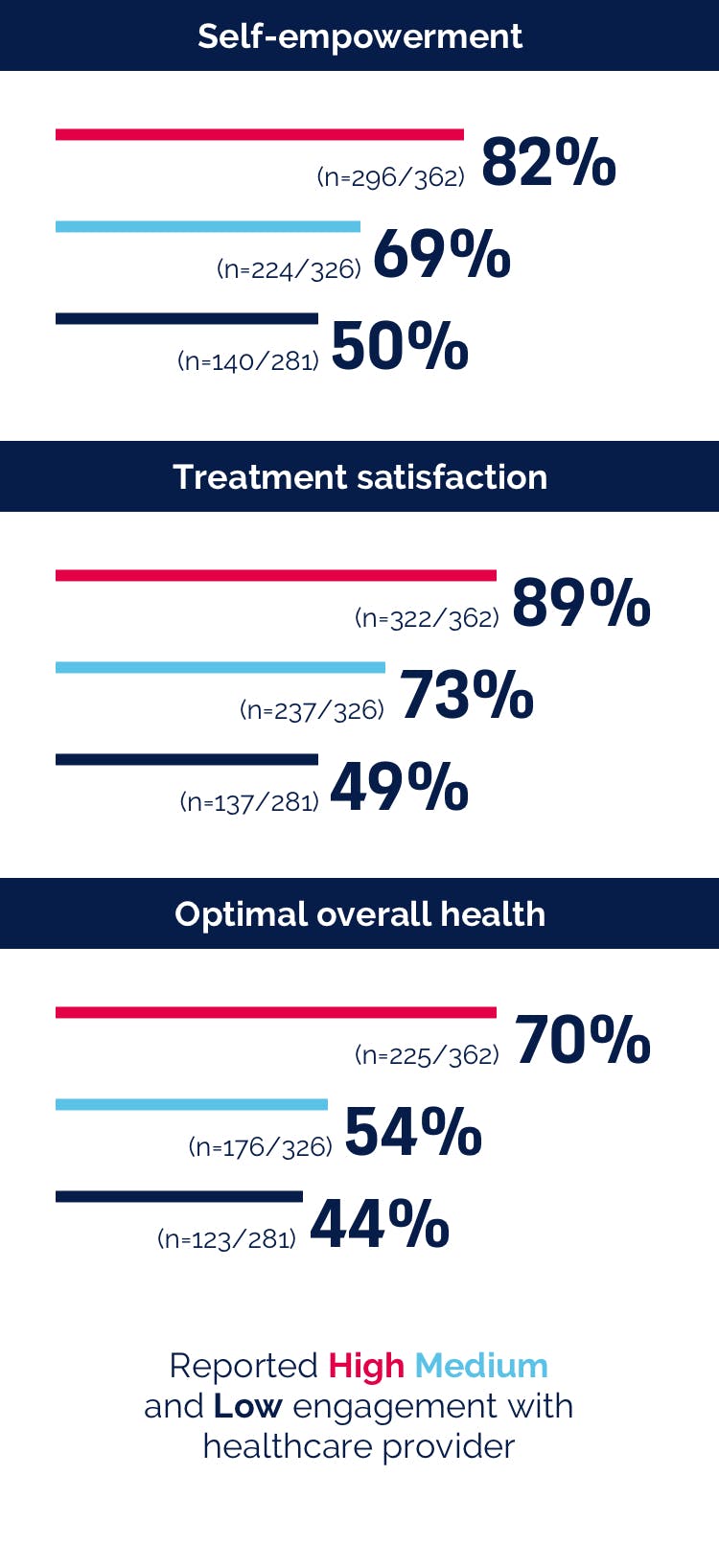
All differences statistically significant at p < 0.05
However, the data also uncovered that many people living with HIV in Europe are concerned about ART side effects and report barriers to discussing this with their healthcare providers. Positive Perspectives results from 12 EU countries showed that of those who reported experiencing ART side effects (39%; n= 379/969):2
- More than a third (36%, n=137/379) indicated their healthcare provider didn’t ask about their side effects
- 43% (n=162/379) reported they were uncomfortable discussing their issues
Newly diagnosed PLHIV aged 50 and over may benefit from more support around how and when to share their HIV status
In 2013, UNAIDS estimated that there were 4.2 million people aged 50 and older living with HIV.3 Similar to other age groups living with HIV, those aged 50 and older require HIV services that meet their specific needs.
Frank Spinelli, Medical Director for US Patient Affairs and Positive Perspectives co-author, explains the key results of the two posters focused on PLHIV aged 50 and older shared at HIV Glasgow:
Findings from the Positive Perspectives study across 25 countries showed that more newly diagnosed PLHIV aged 50 and over were unwilling to share their HIV status – not only with family and friends but also with healthcare providers – when compared to treatment-experienced PLHIV aged 50 and over.4
UNWANTED DISCLOSURE OF HIV STATUS: Newly diagnosed PLHIV aged 50 and over reported greater concerns that daily oral ART increased chances of unwanted disclosure of HIV status compared with treatment-experienced PLHIV aged 50 and over (67% [n=45/67] vs 20% [n=129/632])4
TREATMENT SIDE EFFECTS: Before initiating ART, 76% (n=51/67) of newly diagnosed PLHIV aged 50 and over rated side effects as their most important consideration when starting treatment, compared to 58% (n=376/632) of treatment-experienced PLHIV aged 50 and over 4
“We appreciate how much HIV healthcare professionals work to provide holistic care for people living with HIV, yet those aged 50 and over still worry about disclosing their status. This is such an important step in improving health outcomes and quality of life. Knowing how to tailor support for this group is critical to overcoming stigma and these kinds of psychological barriers to receiving optimal medical care.”
Men who have sex with women (MSW) report greater communications barriers with their healthcare providers compared to men who have sex with men (MSM)
The study also compared differences in HIV treatment experiences, perceptions and behaviours by gender and sexual orientation in 25 countries.5
MSW were most likely to report barriers to discussing health issues with their healthcare providers.
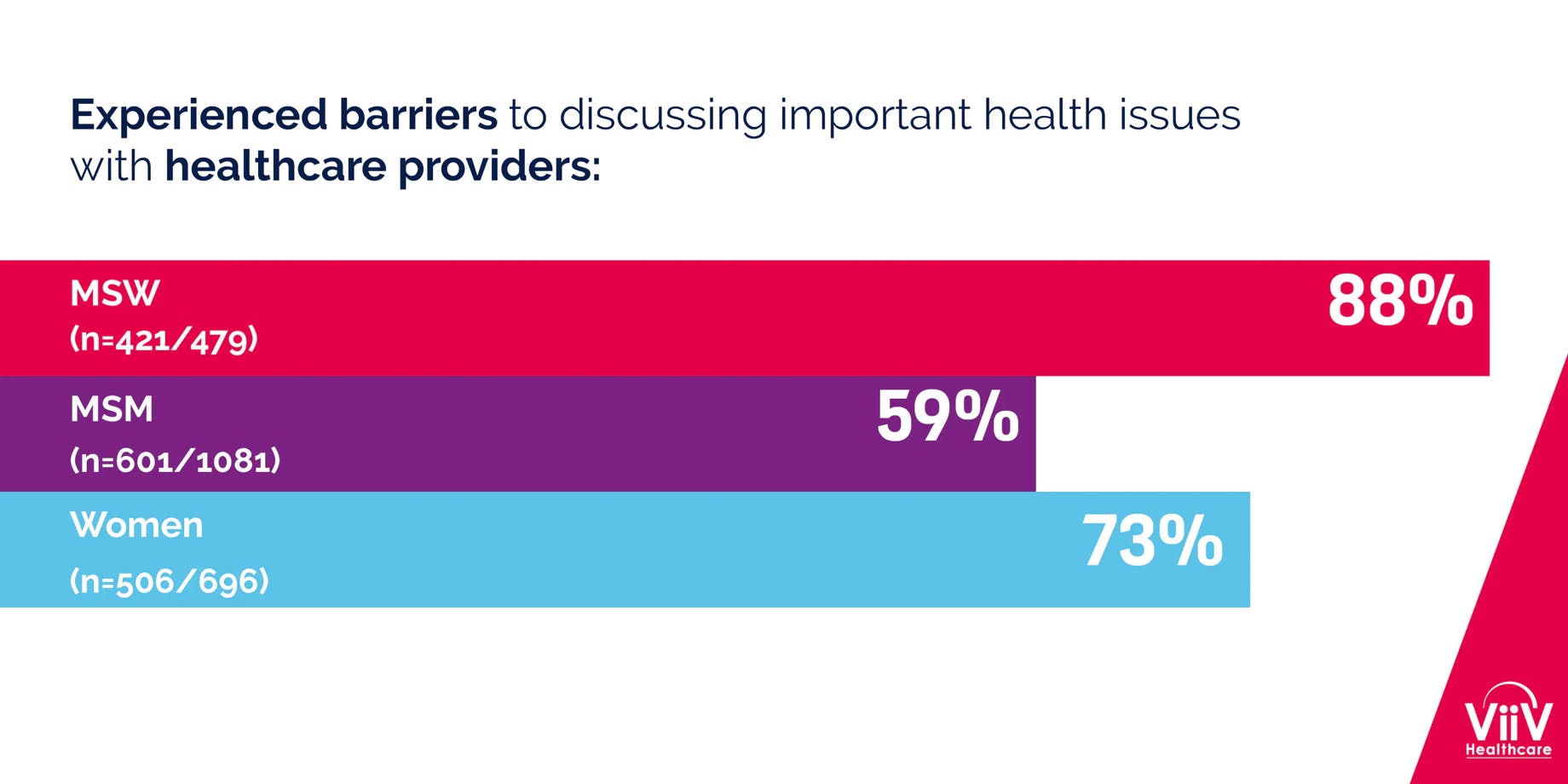
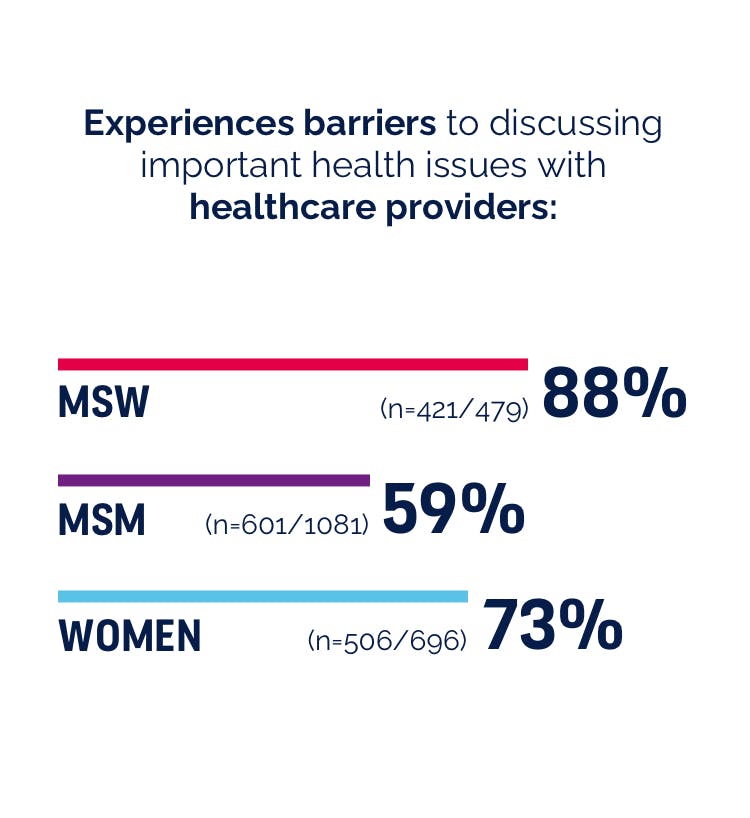
“Given the unmet needs and challenges faced by men who have sex with women, healthcare providers and advocates need to find new ways to engage and communicate more effectively with them. Tailoring our approaches to reduce inequalities will support and help men to live better with HIV and its treatment. This also has the added potential to have a positive impact for their sexual partners, given that women are disproportionately affected by HIV.”
The Positive Perspectives study is one of the largest, global, HIV patient-reported outcomes (PRO) studies to date, with 2,389 PLHIV participating from 25 countries. In Europe these include Austria, Belgium, France, Germany, Italy, Poland, Portugal, Republic of Ireland, Spain, Switzerland, the Netherlands and the UK. Building on the earlier knowledge and insights gained from the initial Positive Perspectives survey undertaken in 2017, this study aims to further identify and explore unmet needs of PLHIV with respect to HIV care, including the impact of the disease on their quality of life.
References
- Lazarus JV, et al. Beyond viral suppression of HIV – the new quality of life frontier. BMC Medicine 2016;14:94.
- Okoli C, Corbelli GM, Brough G, Van de Velde N, de los Rios P. Self-care and involvement in managed care among people living with HIV in Europe. Poster P033 Presented at the HIV Glasgow 2020 Congress, October 5 - 8 2020.
- UNAIDS. The Gap Report. Available at: http://www.unaids.org/sites/default/files/media_asset/UNAIDS_Gap_report_en.pdf. Last accessed: September 2020.
- Spinelli F, Okoli C, de los Rios P, Nwokolo N, Short D. Social, psychological, and treatment-related challenges of a new HIV diagnosis in old age. Poster P008 Presented at the HIV Glasgow 2020 Congress, October 5 - 8 2020.
- Okoli C, Van de Velde N, Brough G, Hardy WD, Corbelli GM, Allan B, Muchenje M, Castellanos E, Young B, Eremin A, Ramothwala P, de los Rios P. What about me? The unmet needs of MSW & differences in HIV treatment experiences, perceptions and behaviours by gender and sexual orientation in 25 countries. Poster P016 Presented at the HIV Glasgow 2020 Congress, October 5 - 8 2020.
YOU MAY ALSO BE INTERESTED IN:
The Global Positive Perspectives Wave 2 Study is one of the largest, global, HIV patient-reported outcomes studies to date, involving 2,389 people living with HIV (PLHIV) aged 18-84 across 25 countries.
The latest Positive Perspectives (Wave 2) is one of the largest, global, HIV patient-reported outcomes (PROs) studies to date and provides perspectives from a diverse group of people living with HIV across the world.
Find out more about how taking multiple medications can affect quality of life for people living with HIV. Data from Positive Perspectives study (Wave 2).
If you get any side effects, talk to your doctor, pharmacist, or nurse. This includes any possible side effects not listed in the package leaflet. You can also report side effects directly via the GSK Reporting Tool link https://gsk.public.reportum.com/. By reporting side effects, you can help provide more information on the safety of this medicine.
If you are from outside the UK, you can report adverse events to GSK/ ViiV by selecting your region and market, here.




